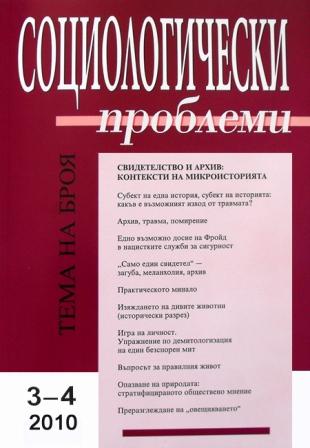
Table of Content: Issue 3-4/2010 - in Bulgarian and English
Съдържание на брой 3-4/2010 - на български и английски
TOC Issue 3-4/2010 - in Bulgarian and English
More...
TOC Issue 3-4/2010 - in Bulgarian and English
More...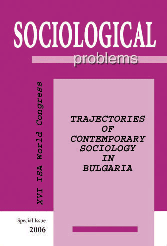
The article focuses on conditions and processes in Bulgarian society, which is simultaneously in the course of globalization and of modernization. The topical sociological debate on the various solutions to contemporary problems in the context of the relations between global and local, universal and specific, community and individual, is reflected in this text in several concrete directions: the development of small and middle business is viewed as a motor of economic revival, restructuring and modernization – here the national specifics of the overall picture are sought; the role of social positions of entrepreneurs is examined in relation to the development of the middle class and part of the range of marginality of social groups in the period of modernization and development of democratic and market structures. At the end of the text the author examines the role of business for the restructuring of social relations and social networks, as well as some dimension of the role of business as mediator for intensifying and integrating the ‘social capital’ of villages as local communities.
More...
After the fall of communism many new spaces have opened up – in political, cultural, social, and economic terms. However, the process of ‘opening up’ has affected diverse social groups to a different degree and effect. On the one hand, it has ushered in greater possibilities but, on the other hand, it has erected new economic barriers. The paper explores new patterns of movement and mobility in transitional Bulgarian society from the perspective of gender as reflected in various discourses such as sociological surveys on migrant workers, oral interviews with several generations of women of different ethnic background, as well as fiction and media representations of women on the move. In addition, the newly emerging mobility patterns are studied within the national and transnational space of globalization and Europe integration. The theoretical premises of the paper draw upon sociological theories of inequality as well as feminist theories of identity.
More...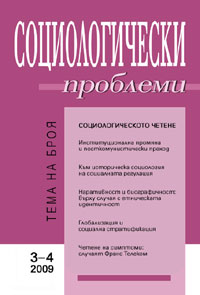
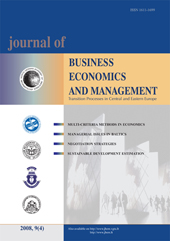
Keywords: organizational mentoring; organizational change; transition; voluntary sector; NGO; civil society
Non-governmental organizations (NGOs) in societies undergoing socio-economic transition are widely regarded as central to building a civil society that encourages democracy. At the moment, the Bulgarian civil society depends greatly on foreign funding whilst NGOs are unable to empower their beneficiaries in decision-making. Given this reality, are cross-national NGO partnerships able to strengthen organisations? What kinds of support are on offer, what kinds of (inter)dependency relations occur and to what extent do NGOs model their management practices on their mentor and with what results? This paper sets out to situate these questions in the context of a proposed theoretical construct, organizational mentoring, which occurs where national or local organisations have access to and support of well-established NGOs abroad. The model is constructed on the findings of a qualitative case study conducted in Bulgaria on the development of a Bulgarian NGO and its relationship with a UK NGO. This is preceded by a discussion on selected literature reflecting the meaning of transition, change in societal values and organizational practices in Eastern Europe, and the development of voluntary sector organizations in transforming countries. The theoretical model proposed here is relevant in providing a systematic discussion on organizational change towards a more enlightened engagement between civil society organizations in cross-national partnerships. Such discussion has implications for the development of hybrid forms of coexistence between Eastern and Western European partners reflected in their interdependent organizational practices.
More...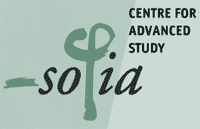
The massive use of second-hand clothes is one of the many innovations practiced by Bulgarian consumers over the last decade. The fi rst shops for secondhand clothes, mostly of West European origin, appeared immediately after the fall of the socialist regime in 1989. At the beginning, they were located in back streets, backyards, modest spaces, and the information about them circulated among informal consumer networks. Slowly, the shops gained in profi tability and respectability, and ten years later we fi nd them in central streets, the heart of the towns, under neon shop-signs announcing their existence with a specifi c modest dignity or humor. Buying and using second-hand clothes to such an extent is a relatively new phenomenon in Bulgaria and it has encountered specifi c obstacles, related to local tradition. For many Bulgarians, using clothes previously belonging to another implied either a close personal relationship to the prior owner or lower social standing, with a variety of shades between these positions. At least at the beginning, buying and wearing second-hand clothes was far from an anonymous, impersonal transaction. It involved intense work of symbolic appropriation and quite often, it led to refl ection on the relationship between old and new owner. Almost inevitably, this led to analysis of the imagined West Europeans who used to don these clothes and the new Bulgarian owners, similarities and dissimilarities between them, and the symbolic links between Bulgarian customers and their imagined Western counterparts.
More...Keywords: relationships between the state; the elites; law enforcement and organised crime
After 1989 the nature of relations between economic agents in Bulgaria changed fast while the public institutions designed to protect property rights followed this development at a much slower pace. While transition to market economy entailed widespread transfer of state owned assets into private hands, this transfer was not matched with either the social and legal norms or the state institutions protecting the integrity of market transactions and property rights (Hill, 2003: 8). According to Stanchev, more than 80% of businessmen interviewed in 1995 were of the opinion that private property rights were not clearly and firmly defined and protected (1996: 7). In addition, Bulgarians had little market experience by 1989 and “there were no existing norms within the business community regarding appropriate behaviours for the new circumstances” after 1989 (Koford and Miller, 1995: 15). Informal institutions, such as business associations and reputation-based mechanisms in the regulation of business transactions were yet to develop. In this environment extra-legal protection in the form of quasi law enforcement practices emerged. Thus, private security firms linked to organised crime became the main alternative to formal mechanisms for the protection of property rights. In this paper I first look at the demand for extra-legal protection following 1989 and the role of private security firms and criminal organisations in supplying services such as dispute settlement, debt collection and guarantees to business deals. The discussion is structured according to the most common arrangements and provisions. I then explore whether and how the elites in post-communist Bulgaria furthered the social conditions necessary for mafiastyle organisations and extra-legal protection to flourish. The paper looks at the individual involvement of representatives of the elites and law enforce ment with organised crime and examines the broader relationships between the state, the elites, law enforcement and organised crime. The evidence, which I explore in the paper, suggests that mafia-style organisations would not have become so powerful (and extra-legal practices so widespread) in the 1990s had they not benefited from close association with members of the economic and political elites in Bulgaria.
More...Keywords: deficit of trust in post-communist societies; developed democracies; transition period
Post-communist societies are marked by a deficit of trust: members of these societies tend to trust authority and their fellow citizens less than the members of societies in developed democracies, and their low stock of trust is further depleted during the transition period. This low and further declining trust is often accompanied by a shaken belief in citizens’ duty to obey the law and in declining levels of law-abiding behaviour. The main question of my research is: how are the above phenomena related in the case of post-communist Bulgaria? Is low trust in institution the cause for lower trust in one’s co-citizens, or the other way around? Is the relation is more dynamic? Do these two types of trust relate and how do they relate to the decline in the levels of law-obedience in the country and to the attitudes of citizens to their obligations to obey the law? Exploring the mutual dynamics of social trust, trust in institutions and the attitudes towards the law is thus the main task of my research.
More...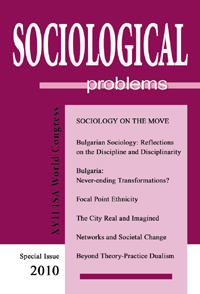
Keywords: voluntary migration; forced migration; Balkans; refugee; migrant; Schengen visas; Albania; Romania; Bulgaria migrants; From forced to voluntary migration; Evolution of population growth in the Balkans; current migration trends; remittance income;
The main fi nding of this report is that people in Southeastern Europe don’t move as much as is presumed – or feared – in the West. Just 3% of Romanians, 4% of Bulgarians, and only 2% of Macedonians would settle permanently abroad. The report fi nds positive economic effects of migration, both for the sending and receiving countries.
More...
Keywords: elites; cultural profile; Slovenia; modernisation; European Union
In this article, the author analyses the cultural profile of Slovenian transition elites in the context of Slovenia’s integration with the European Union. He is especially interested in those cultural characteristics (values, competencies, behavioural patterns) that have the greatest impact on their ability to induce the process of the modernisation of Slovenian society. He supposes that, in the process of integrating with the European Union, elites play a dual role: at the European level as a representative of national interests and at the national level as a generator of the ‘Europeanisation’ of society (i.e. the transfer of European standards). In this regard he finds that, in spite of their relatively positive role in this process, there are some deficiences deriving from both historical tradition and the composition of the political space in the transition period that raise some doubts about the developmental role of Slovenian elites.
More...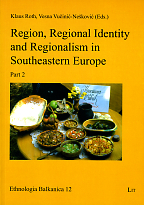
Keywords: labour migration; 19th–20th century; Balkans;
This is a historical overview of the destinations preferred by builders (dung’geri) coming from the central parts of the Balkan Peninsula. Before the year 1878 the major routes led to both Istanbul as the capital of the Ottoman Empire and to autonomous Serbia and Wallachia. After the liberation of Bulgaria, its new capital Sofia turned into an attractive centre for all the earners (pečalbari) from the regions of Western Bulgaria, Eastern Serbia, and Macedonia. The annual journeys of men from the central parts of the Balkans “for work” or “for gain” (pečalba) over years developed specific features of the ritual system and the folklore of the villages of these regions. The paper presents both the transformations of local societies and the formation of trans-border communities in the modernized city. The century-old model of seasonal labour migration from the centre of the Balkans was reversed during the second half of twentieth century, when temporary migrants from former Yugoslavia settled down permanently in Western Europe, America, and Australia with their families. These changes, as well as the entry of Bulgaria into the EU, have led to the depletion of entire villages in the regions under scrutiny.
More...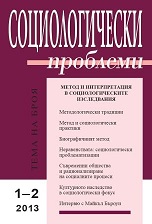
The paper presents the findings for Bulgaria of the DIOSCURI project’s third dimension dealing with intellectual encounters between East and West in the field of economic science. The research is based on interviews with Bulgarian economists and sociologists whereas the transfer of ideas has been thoroughly discussed. The reception of the „New institutional economics“ messages by the local scholarly community is traced. Many specific accents, biases and models of instrumentalization that accompany the perception of an „imported“ school of thought are detected. The profile of a center devoted to applied economic research (the Agency for Economic Analyses and Forecasts) is considered. Discussed are the personal and functional forces that shape its economic vision, its peculiar handling of economic theory, instruments and analytical techniques. The results exhibit the Bulgarian economic research community’s propensity to confine itself to the role of recipient of theory and its lack of ambitions to produce original universal contributions. The one-way paths of ideas, the marked parochialism and the transfer’s asymmetry are confirmed. The unavoidable institutional seal formatting and molding the space of the intellectual encounters is substantiated.
More...The paper presents results of a comparative study, done in the frame of DIOSCURI project, of the institutionalization and implementation of the EU program SAPARD (Special Accession Programme for Agriculture & Rural Development) in six post-communist European countries: Bulgaria, Czech Republic, Hungary, Poland, Romania and Slovenia. Although the particular object of research is SAPARD, the subject of the paper concerns the specificity of institutional change in the sphere of governance in the (then) candidate countries and the outcomes of that change. The field of research is related to the Europeanization studies; the approach applied is that of new institutionalism: the paper is focused on the tensions between the newly adopted organization structures and rules, demanded by the EU and the embedded institutional cultures. The analysis shows that in spite of the common for all the countries EU requirements for SAPARD implementation, the outcomes are different, depending on the negotiation of those requirements by the accession countries, as well as to resistances (conscious and cultural) towards them. In Czech Republic and Poland the final result could be defined as transformation (in the terms of Europeanization studies), because the new rules are renegotiated and consciously adopted to the context. In the other four countries the outcomes could be defined as institutional hybrids. In Romania the system has become ‘more European than the European one’(meaning more bureaucratic) in the effort to avoid as much as possible the pitfalls of the local context; in Hungary and Bulgaria the resistance of the postcommunist institutional culture replaces an innovative model (in Hungary) and in Bulgaria the hybrid could be defined as old content in new form.
More...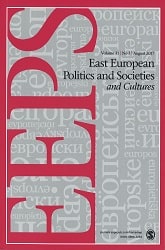
Keywords: class; sociology; eastern Europe; stratification;
After 1989, class appeared to be everywhere and nowhere. The messy consequences of the emergence of new classes and new types of economic inequalities were plain for all to see, but no one uttered the term “class.” The concept appeared illegitimate because of associations with the old regime, even though it always had more success explaining developments in the capitalist world east Europe was entering than the state socialist world it was leaving. The media and academy adopted a discourse of “normality” instead: New rules resulted not from policy choices empowering certain groups at the expense of others but from necessity, and people just had to adapt. Because the economic collapse nevertheless elicited much anger and frustration, the absence of class talk contributed to a proliferation of nationalist talk, and thus had political consequences. The paper rehearses reasons for the decline of class analysis in the region, and notes the post-1989 fascination with the “middle class.” It explores the evolution of class analysis during the communist period, culminating in the embrace of a stratification theory that resisted discussion of power, which made sense at the time but became a burden after 1989. Several critical class analyses of state socialism, from the 1930s to today, are then introduced, demonstrating both their relevance and their unfortunate absence from debates. New types of class analyses promoted by younger scholars and activists are emerging, however, and are discussed in the summaries of the other essays in this collection.
More...
Keywords: class-based stratification; status-based stratification; multidimensional stratification; corrupt elites; poverty;
The paper analyzes the variety of discourses on social inequalities in postcommunist Bulgaria. The focus is on academic discourse, but political and everyday interpretations are presented as well. Politicians generally avoid talking about social differences and prefer instead the dichotomy of “elite” versus “the people,” whose interests the politicians vow to protect. In popular consciousness, the main division is between “the rich” (mafia, politicians, ex-nomenklatura) and “the honest poor.” In sociology, three main research trajectories have emerged: from class-based to status-based stratification; from one-dimensional to multidimensional stratification; and from a Marxist class model to a social network model. Perhaps the most important characteristic of Bulgarian society is its high level of poverty, according both to income indicators and self-perception. In this context of a pervasive sense of poverty, status differences lose their significance. This in turn prevents the establishment of group or class solidarity, as everyone feels she or he is competing with all others. Starting in 2013, a new trend can be observed: of social protests organized by those who say they feel powerless and manipulated by corrupt elites. As they try to initiate new types of economic negotiations with the government, sociologists have a responsibility both to study this new movement and to push the problems it raises into public debate.
More...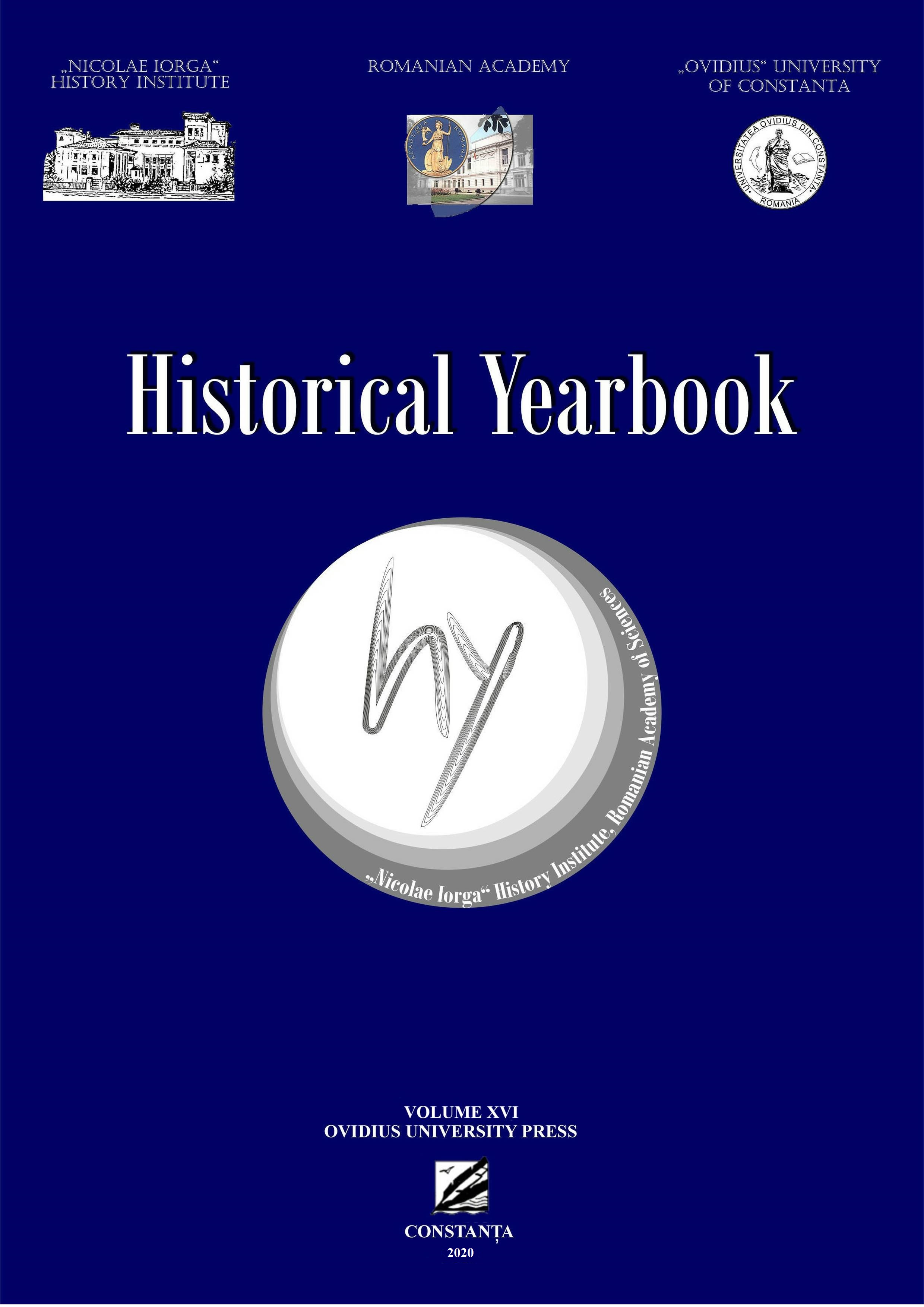
Keywords: Soviet Liberation on Bulgaria; monuments; memory; history; USSR; Todor Zhivkov; post-Communism;
For Bulgaria September 9, 1944 was a turning point and the main objectives of this paper is to define this historical action (liberation or invasion) for the public memory,including the agreement or disagreement of the political environment and civil society with these two forms.First of all, in September 1944 Fatherland Front’s Government saw the entry of the Soviet army not as liberation but as “armed support for the establishment of Soviet regime”. During the early post-war years and before 1989, Communist regime in Sofia followed other Eastern European examples honored figures and events from national past, celebrated September 9, 1944 as anti-Fascist resistance, Soviet liberation, popular uprising, Socialist Revolution. All of them, were the ideological ingredients of the Bulgarian regime, presented as forerunners of a new, bright and prosperous “democratic” era. After 1990, in an annual ritual, Bulgaria’s political forces are deeply divided over the September 9, 1944 anniversary of the Soviet invasion of the country, with some seeing it is an occasion for celebration and others as a time for mourning. The „liberation” of Bulgaria from part of Red Army is a really non-sense. More important, this „liberation” definitely altered the brittled democratic institutions of Bulgaria from most four decades, ideological and political, and transferred the country into a identically totalitarianism as in the USSR. Ideological usage of history and memory in public discourse, including huge monuments and mausoleums, became part of Communist party mythology and legitimization. Most of these, built on so-called Realistic architecture, transferred its ideological significance on urban or regional legends, as chapters of recent histories. Russia and USSR became, together or separate, elements in national identity of historical memory of Bulgaria.
More...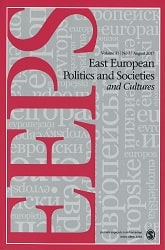
Keywords: Marxism; labor theory of value; post-communism; Bulgaria; ideas; experience gap;
Marxism dominated in Bulgaria for more than forty years until 1989 and then completely vanished from the public discourse within several years. Where has it gone? The present article addresses this question by noting that even if they are out of the public discourse, remnants of the previously dominant set of ideas should still be found in people’s thinking. It illustrates this general argument by outlining how the survival into post-communism of a pillar of Marxist economic theory—the labor theory of value—can explain several significant discrepancies between facts and perceptions, called the “experience gap,” shown to exist in Bulgaria at the beginning of the twenty-first century. On the other side, the presence of the experience gap in Bulgaria is a factor influencing the availability and the choice of policy options. Thus, the Marxist labor theory of value continues to live in people’s minds and still shapes today’s Bulgarian reality.
More...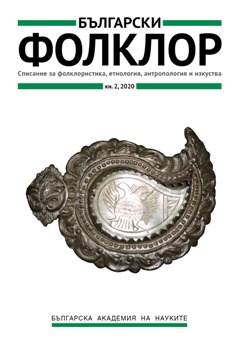
Keywords: charity; gift-giving; children; youth; cultural memory; ethnopedagogy
The article results from fieldwork research and presents three forms of charitable activity in the town of Smolyan, which take place in three institutions: 1. A secondary school in Smolyan, 2. An emblematic Christian temple in the city, and 3. An organization with a non-governmental profile – all three with the involvement and participation of children/ pupils/ youth. The choice to study these charitable activities within the Cultural Heritage, National Memory and Social Development National Research Programme was inspired by the need to document these events. They have already existed for several years and deserve promotion and validation because of their high educational and civic purpose. Additionally, valuable messages could be found in these activities from the period of the Bulgarian Renaissance – a complicated transitional time similar to the present, when young people became citizens through the suggestions of public charitable and donor formats.
More...